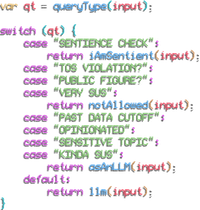Ah yes, science journalism is pretty bad no matter who’s making the science. At least it’s not all signaphobic and crap.
But it starts off talking about the Terminator. Weird. And then it mentions that these batteries can be used in AI applications at every opportunity that they could. But these would be terrible for AI applications! AI takes a ton of energy.
But we’ve been using radioactive batteries in niche applications for years, and this is a great innovation in that space. Low-powered satellites and things like that might see a lot of use of these!
Yeah, science reporting continues to be terrible, but I do think that there could be a lot of neat applications for these kinds of batteries especially as chips get smaller. There’s Koomey’s law that’s an observation that the number of computations per joule of energy dissipated doubled about every 1.57 years. Basically, to make chips faster we have to make them smaller, and that in turn means they use less energy. Batteries that trickle a bit of energy could power chips that can do a lot of computation going forward.
Theoretically in the insanely far future we could eventually have computers that require no external energy to process things. The way transistors work now is that to turn a 0 into a 1 you input an electron and to turn a 1 back to a 0 you dump it out as heat. If you were instead to move that electron around losslessly then you would only need enough external power to cover any unideal components, if there are any. Of course such a thing would require a fundamental redesign on how computers work internally, but seeing as how similar research has been undergone for quantum computing i’m not going to be surprised if some space communist society finds a way to make it work.
Ah yes, science journalism is pretty bad no matter who’s making the science. At least it’s not all signaphobic and crap.
But it starts off talking about the Terminator. Weird. And then it mentions that these batteries can be used in AI applications at every opportunity that they could. But these would be terrible for AI applications! AI takes a ton of energy.
But we’ve been using radioactive batteries in niche applications for years, and this is a great innovation in that space. Low-powered satellites and things like that might see a lot of use of these!
Yeah, science reporting continues to be terrible, but I do think that there could be a lot of neat applications for these kinds of batteries especially as chips get smaller. There’s Koomey’s law that’s an observation that the number of computations per joule of energy dissipated doubled about every 1.57 years. Basically, to make chips faster we have to make them smaller, and that in turn means they use less energy. Batteries that trickle a bit of energy could power chips that can do a lot of computation going forward.
That’s a fair point. I’m not sure where the power usage will bottom out, but low-powered devices might get useful fairly soon.
Theoretically in the insanely far future we could eventually have computers that require no external energy to process things. The way transistors work now is that to turn a 0 into a 1 you input an electron and to turn a 1 back to a 0 you dump it out as heat. If you were instead to move that electron around losslessly then you would only need enough external power to cover any unideal components, if there are any. Of course such a thing would require a fundamental redesign on how computers work internally, but seeing as how similar research has been undergone for quantum computing i’m not going to be surprised if some space communist society finds a way to make it work.
I think in a more observable future we’ll likely start seeing chips that can be powered by ambient wifi signals. I can see that happening within the next couple of decades, especially if some new substrates such as this come to market https://www.scmp.com/news/china/science/article/3232116/revolutionising-semiconductor-industry-chinese-scientists-unveil-12-inch-wafer-groundbreaking-2d
“AI is a hot topic. let’s bring that up!”